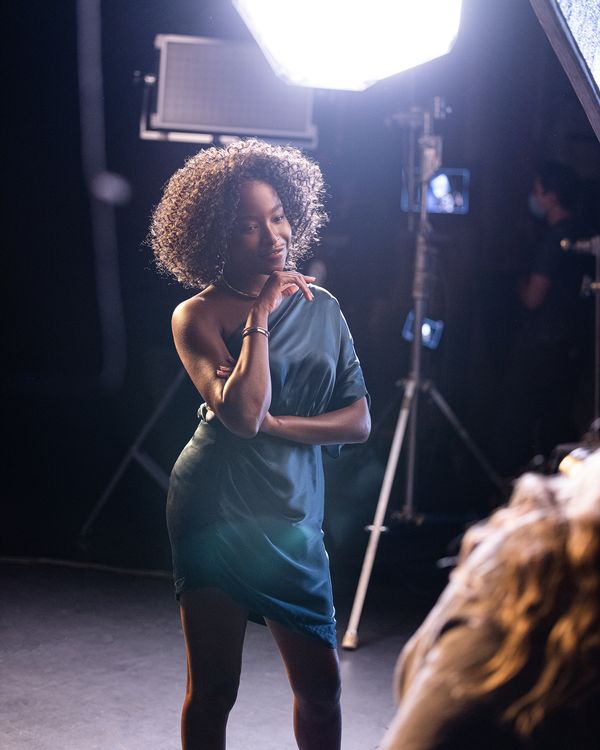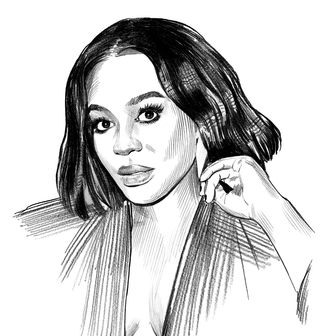
Not only did Amanda Gorman make history when she became the youngest poet ever to perform at the presidential inauguration in January 2021, she also created one of the biggest beauty moments of the year: a bright-red Prada headband on top of her styled Senegalese twists, which were swept into in an updo. And when we talk about influence, Gorman has it. According to Lyst, a fashion search engine, searches for “red headband” jumped 560 percent right after Gorman’s speech. So it makes sense that, in September of last year, she announced a partnership with Estée Lauder as its newest ambassador.
But she’s more than just a face of the brand — she’s Estée Lauder’s first-ever Global Changemaker, which means she helps curate the company’s Writing Change program, a $3 million initiative to support grassroots organizations that advance literacy.
Gorman started writing poetry when she was 5 years old. “I didn’t know that it was poetry at the time because I didn’t have that as a word yet,” she says. It was her third-grade teacher, who was also a professional writer, who introduced her to the idea of using her words, which she kept in her private journal at the time, and turning it into a career.
Representation is also activism for Gorman’s career: “In beauty, we see not just racism but colorism as well and all these other ‘isms’ which intersect and complicate issues of representation,” she says. “I’m excited to see this open up a bit more space, especially for our darker-skinned sisters, to feel more seen and validated by the beauty industry.”
We chatted with Gorman recently.
You possess such poise and conviction when you’re onstage, especially when you’re performing poetry. Has confidence always come naturally to you?
No. My most chronically unconfident phase, which I think many people experience, is that awkward phase around and after puberty — so much is changing, and your body’s transforming overnight; it’s kind of giving werewolf vibes. And I just remember feeling so out of touch with my body and not feeling beautiful or cute. And I think those are the standards that people hold women’s bodies against. Either you’re sexy or you’re cute, and if you’re not, you’re a failure to the female sex. During that time, my mom gave me a practice to do every day, which is to look in the mirror at night and say to my reflection, “I am beautiful. You are beautiful.” And to do that for at least a month, which I did. And I actually found that it was a great help. It really solidified a practice for me of tending to my own esteem and confidence and not expecting it to be given to me by the world but to be demanded for myself.
Yes, I actually wanted to ask you about your natural hair because I love all of the twists and box braids you wear. Talk to me about the decision-making process behind your hair choices?
It depends on what I’m doing in the space and what that demands from my hair. So, for example, if I’m performing, I like to keep my hair natural, but I also have to keep those curls out of my face because I’m using my hands and my mouth — I need to see the papers in front of me. And so trying to go for looks that allow room for performance and poetry but also play in different avenues of my Black heritage and just darn-right creativity. For my beauty inspiration, there’s a broader gambit of my heritage that I look to whether I’m doing research on my West African roots or looking at beauty trends that have been popular in the Black community. Every decision I make — whether it be wearing my hair natural, wearing a foundation that actually matched my darker skin, or wearing bright colors at masculine gatherings — were all both political and personal statements of who I was and what history I was bringing into the space. And so those are also things that my team and I have conversations about, where the question is, How can we make this look as fun and as me as possible but all in service to the poem or the words or the cause? And if there’s anything that feels like it isn’t an instrument toward that, then maybe that’s not the look that we go for.
What would you say is your favorite word or phrase to use in poetry?
The word hope. The reason I like it is because no matter what thesaurus or dictionary I go to, as well in different languages or seeing how different writers approach it, it’s a word that’s not easily replaced. And it’s not a word that’s easily toppled. So if I’m writing a poem and I use the word hope, often there’s not a word that I can absolutely tell you would fit better, do better, be more powerful. It kind of has its own history and meaning across time, space, and culture. So I love it.
What’s the last thing that gave you a good laugh?
So there’s this YouTube channel I really like called Cinema Therapy. It’s a filmmaker and a therapist and they analyze films, and it’s just so funny. And I was just watching their video on Coraline, which is one of my favorite films, and just seeing the reactions to that film was chef’s kiss. I laughed superhard.
Meanwhile the rest of us are scrolling Instagram or cackling at TikToks.
I think social media can kind of feel like a fire hydrant that you uncap and you look up three hours later and you’re on the sidewalk wet because you’ve just absorbed all this stuff shooting your way — which, you know, to each their own. Since I have so many demands of my time and my mind, I have to be incredibly intentional when I’m going into that space and put some boundaries on what I’m intaking. What am I here for? Am I connecting? Am I socializing? I think, honestly, if you consume too much, then it begins to consume you.
So what do you do at the end of your day instead?
I love playing ASMR on my computer. I’m the type of person where I do get that calming, soothing feeling. So I’ll play some type of night-rain, fire-crackling ASMR. And then I’ll drink some tea and have that as my sacred time to read a beloved author. I’m often reading Shakespeare at night, if not Charlotte Brontë or Anne of Green Gables — kind of just classics that make me feel as if I’m a little kid again and just enjoying language and storytelling and fantasy.
Gorman’s nighttime skin-care routine includes Estée Lauder’s Advanced Night Repair Serum, which includes a potent dose of hyaluronic acid to repair and replenish the skin’s moisture barrier. “It’s not a product that’s necessarily about changing or manipulating the aesthetics of what you look like,” she says. “But it’s actually doing regenerative work in the nighttime, which I love because I think a great look starts with making sure your body is as healthy and repaired as it can be.”



